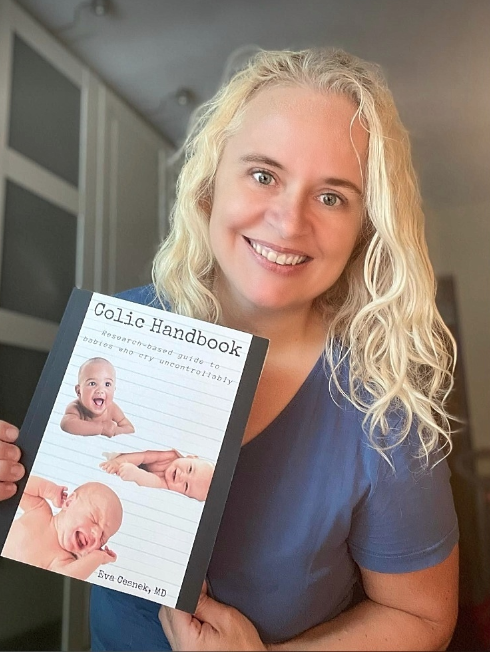
Do you know what it feels like to hear your baby cry for three hours straight in the middle of the night? Colic – frequent, persistent crying for 3 or more hours a day on at least 3 days a week in an otherwise healthy baby – affects up to 25% percent of babies in the United States every year. Treatments are sparse, and the baby’s incessant crying frequently leaves parents feeling helpless, frustrated, and exhausted. This can create strain on their relationships, workforce productivity, and their health and well being. Couples with colicky babies have higher divorce rates and relationship distress overall.
Many professionals still believe that excessive crying in babies cannot be prevented or treated and will go away without lasting effects. This is partially a myth. There are various techniques to help prevent colic, including improving gut health in mothers during pregnancy and after giving birth as well as changing a breastfeeding mother’s diet or the type of baby formula. Some intolerant babies may cry more when breastmilk or formula contains soy or dairy. Some babies given standard formula can cry more than those given a specialized formula supplemented with larger amounts of β-palmitic acid.
Parents must be mindful of how crying babies perceive the world. Mimicking the baby’s pre-birth experiences and providing quick, consistent comfort can help. A difference between some cultures with little colic and those with a lot is how quickly and consistently babies are comforted.
At the same time, parents must also monitor their own mental health and seek appropriate treatment support. Help can come from medical professionals, friends, family, postpartum doulas, and others.
A baby with colic is at increased risk of experiencing migraines later in life. Mothers with migraines are more likely to have babies with colic. Certain hormonal abnormalities are associated with both colic and migraine headaches. Early recognition and treatment of migraine headaches can reduce their intensity.
In addition, some babies with colic are more likely to have difficulties with self-regulation later in life. If babies with significant feeding and sleeping challenges cry inconsolably for more than 6 months, they are at increased likelihood of later being diagnosed with a developmental disorder. Some of these children may benefit from early diagnosis and intervention. This is new research not previously published in a parenting book about colic.
Books are often cheaper than medical co-pays and can offer general education. The Colic Handbook is full of research studies, personal stories, and inspiration. It presents colic in a new way as it hopes to educate, prepare, and empower parents to help soothe their babies.
ABOUT DR EVKA (EVA CESNEK, MD)
Dr Eva (Evka) Cesnek has written the Colic Handbook, a comprehensively researched book offering practical, easy tips for frazzled parents. When her baby had colic, the available information seemed insufficient. She thought the topic needed more thorough discussion. She came up with a new way to view colic after reviewing hundreds of research articles and using her clinical experience. Frazzled parents can feel empowered with knowledge about best practices for their persistently crying babies.
Other family physicians and pediatricians have commented, “If only this vitally important book was available when we had our babies…” Doctor Evka presents this new, research-based take on colic at medical conferences and talks across the country. Her insights are poised to have impact.
CONTACTS
Website: www.EvkaMD.com
Instagram: EvkaMD
Free physician-led parental book club: https://evkamd.com/free/
Book: https://www.amazon.com/Colic-Handbook-Information-Caregivers-uncontrollable/dp/B0B5KQ44X9
Facebook: https://www.facebook.com/RefluxPhysician/
Media Contact
Company Name: Doctor Evka, LLC
Contact Person: Eva Cesnek, MD
Email: Send Email
Phone: 9086799295
Country: United States
Website: www.EvkaMD.com
